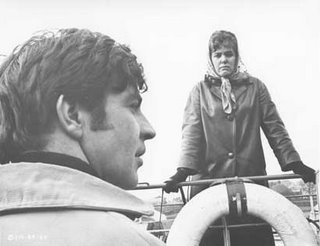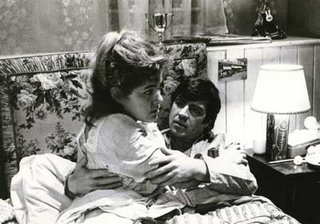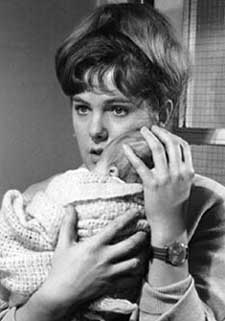 I can always place my age--ten--when my father brought home our dog Georgie because my mother named her after the Seekers' song, "Georgy Girl" (as you can see, we erred on the spelling). I don't recall seeing the movie Georgy Girl on its 1966 release (or since), until today--even though it seemed vaguely familiar; but I would have to guess it didn't play on '70s television, with its unmarried cohabitants and casual abortion references--well, the latter being the actions of the movie's only "villain," Charlotte Rampling's Meredith, eager to get rid of yet another unwanted pregnancy, but this time sticking it out, under Georgy and the father Jos' (Alan Bates) influence--still, there it was, the shadow of an issue that would've never made it to UHF television in those days. And it doesn't seem the kind of movie to have cropped up on basic cable much.
I can always place my age--ten--when my father brought home our dog Georgie because my mother named her after the Seekers' song, "Georgy Girl" (as you can see, we erred on the spelling). I don't recall seeing the movie Georgy Girl on its 1966 release (or since), until today--even though it seemed vaguely familiar; but I would have to guess it didn't play on '70s television, with its unmarried cohabitants and casual abortion references--well, the latter being the actions of the movie's only "villain," Charlotte Rampling's Meredith, eager to get rid of yet another unwanted pregnancy, but this time sticking it out, under Georgy and the father Jos' (Alan Bates) influence--still, there it was, the shadow of an issue that would've never made it to UHF television in those days. And it doesn't seem the kind of movie to have cropped up on basic cable much. One thing is certain: I knew from the song that our terrier-sized mutt was too high-strung to be "Swingin' down the street so fancy-free." And I did have a general sense of the plot, probably from the song lyrics--"dowdy" girl seeks love--and, more than that, an image of Lynn Redgrave's rueful little grin, not quite swingin' in her particular '60s, set in a colorless, rain-spattered London. For years the movie has occupied the same space in my time-closet as To Sir, With Love (1967), a second black-and-white snapshot of a future I wasn't sure I was going to get--or necessarily wanted. It seemed a bit frayed at the edges, cut loose from secure moorings.
 Little did I know how right I was, how spot-on were Georgy girl's sad, almost-frightened slumped shoulders and uncertain advances into a larger world. I confess I identified not with Alan Bates' kinetic rowdy, Jos Jones, but with Georgy's halting uncertainty--and, finally seeing the movie today, I was right: I understood with her that the move into "adulthood" is beset with exhausting delays and half-measures. Georgy searches for a firm place to stand, purused by her father's employer, millionaire James Leamington, played with just a touch of post-Lolita self-consciousness by James Mason; and by Jos, dance-hall-clownish but calculating, capering but icy-eyed, who loves then leaves Georgy. She ends up with the millionaire, who takes Meredith's unwanted baby as part of the deal, while Jos skips away--his posture, though, a bit slumped himself as he stands alone on the pier, another messy interlude along Georgy's way.
Little did I know how right I was, how spot-on were Georgy girl's sad, almost-frightened slumped shoulders and uncertain advances into a larger world. I confess I identified not with Alan Bates' kinetic rowdy, Jos Jones, but with Georgy's halting uncertainty--and, finally seeing the movie today, I was right: I understood with her that the move into "adulthood" is beset with exhausting delays and half-measures. Georgy searches for a firm place to stand, purused by her father's employer, millionaire James Leamington, played with just a touch of post-Lolita self-consciousness by James Mason; and by Jos, dance-hall-clownish but calculating, capering but icy-eyed, who loves then leaves Georgy. She ends up with the millionaire, who takes Meredith's unwanted baby as part of the deal, while Jos skips away--his posture, though, a bit slumped himself as he stands alone on the pier, another messy interlude along Georgy's way. As the credits roll at the end, Georgy sits in her wedding-car, baby in arm, while Leamington, having what he wants, fumbles, befuddled. And Georgy stares ahead, her smile fading; but she no longer averts her eyes from a world that has held her pudgy face and blocky frame off to one side, a little scorned and a little cast-off. The title song plays merrily along, a weird counterpoint (like so many '60s movie and TV themes, narrating the plot--"You're rich, Georgy girl") to Redgrave's solemn--sad? resolute? hard to tell--face, moving onward past the '60s into her version of adulthood.
 I'm reminded of the "Up Series," begun by Paul Almond in 1964 and continued ever since by Michael Apted, a lifelong documentary in which a group of English boys and girls--now men and women--have been interviewed every seven years since they were seven years old themselves; Apted completed 49 Up last year--and I'm 49 myself. I will write about this series another time; in passing, let me say that in its own way it is my favorite documentary--and why not? It has followed me, year for year, most of my life. It intersects with Georgy Girl because of its monochromatic haziness--so close, and yet in another world, far from my own postadolescent stasis (at least Georgy moves). Still, I felt I would in part inherit that world; and the thought made me a little afraid. It seemed more about loss than gain--which for me turned out to be the truth for some years.
I'm reminded of the "Up Series," begun by Paul Almond in 1964 and continued ever since by Michael Apted, a lifelong documentary in which a group of English boys and girls--now men and women--have been interviewed every seven years since they were seven years old themselves; Apted completed 49 Up last year--and I'm 49 myself. I will write about this series another time; in passing, let me say that in its own way it is my favorite documentary--and why not? It has followed me, year for year, most of my life. It intersects with Georgy Girl because of its monochromatic haziness--so close, and yet in another world, far from my own postadolescent stasis (at least Georgy moves). Still, I felt I would in part inherit that world; and the thought made me a little afraid. It seemed more about loss than gain--which for me turned out to be the truth for some years. So Georgy Girl discomfits me today, but only as an unexpected glimpse of myself in a sudden mirror. Somewhere or other, James Thurber describes such an encounter with a mirror as a kind of horror, a cruelly objective revelation, as you see yourself naked and pitiable; I prefer to think of it as an aching twinge, like touching a sensitive tooth, followed by relief as the pain passes, like swift septets of years, up and up.
No comments:
Post a Comment